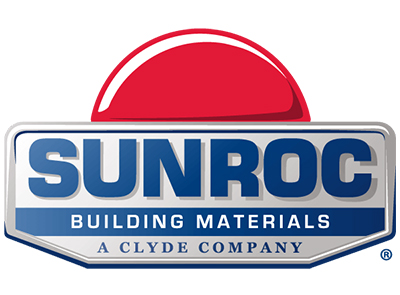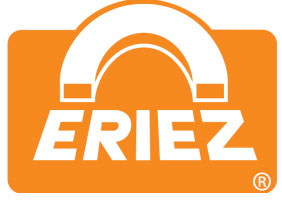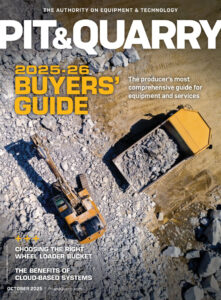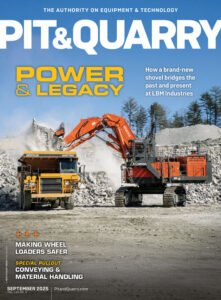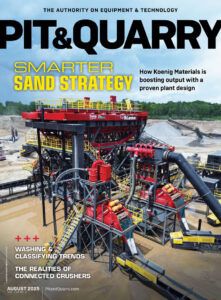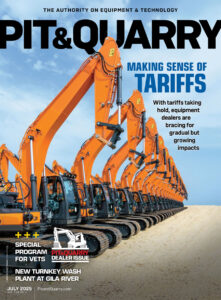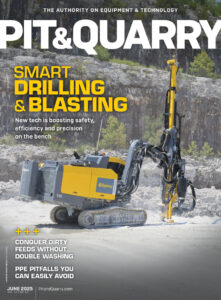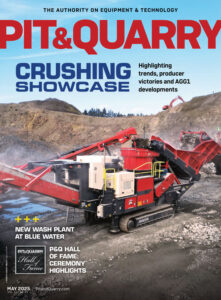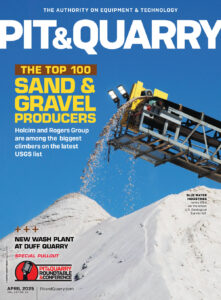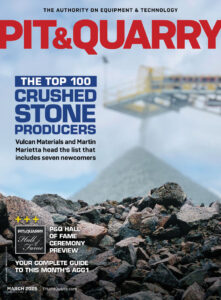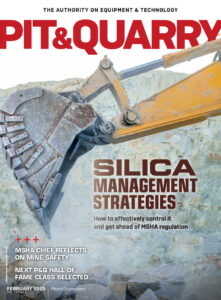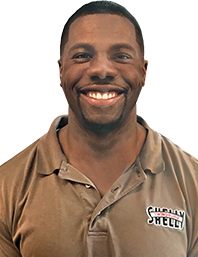
Ken Rogers has steadily climbed the ranks at The Shelly Company, a CRH company, where he currently serves as area aggregates manager in northeast Ohio. A graduate of the University of Akron, P&Q caught up with Rogers to learn about his 10 years at The Shelly Company and find out what the company’s been up to lately.
How did you get your start in the aggregate industry?
My background is construction engineering, and I started with that. As [someone else] progressed into a lead operations manager role, it opened up some doors to learn more about the agg side. It was 2014 when I came over to the aggregate side, and I started out as kind of an assistant operations guy, helping out the plant managers.
Construction and aggregate are two different worlds, so I was trying to get acclimated to that. From there, I got promoted to plant manager overseeing all of the day-to-day operations at our Massillon Quarry in Massillon, Ohio. I got back to what I was used to – having my own crew, running my own site. That was fun. I got to see some more day-to-day things, be innovative on the plant. The experience really helped me from a learning standpoint. It taught me how to troubleshoot certain things, how to identify bottlenecks in a plant.
I did that all of 2017 and part of 2018. I was promoted this year to area aggregates operations manager, [overseeing] four locations. We have one in Petersburg, Ohio, which has our limestone quarry, and we have three sand and gravel operations – one each in Massillon; Streetsboro; and Shalersville, [Ohio].
What surprised you most as you transitioned fully onto the aggregate side of The Shelley Company?
With construction, we’re more man-driven with our production. With aggregates, it’s more mechanically driven. It’s understanding components – the conveyors, screens. The efficiencies of all of those types of components required a learning curve. It was something that put me out of my comfort zone a little bit, but it was also something I welcomed.
When you’re on a paving crew, the paver doesn’t operate by itself. You need guys to run it. If you go to an aggregate plant, you can turn it on and she can go. The guys do a lot of maintenance, cleanup and troubleshooting, but for the most part, if things run smoothly, the plant will do its thing.
From the standpoint of being diligent on our maintenance and staying ahead of things, being proactive instead of reactive is critical. Those plant maintenance days are huge.
I like to tell our guys that there’s always going to be that uncontrollable factor, but we can only control what we can control to the best of our abilities. I’m still a firm believer in that for anything. There are always things you can’t control. You learn to adapt and roll with the punches. You always have to keep a level head and understand that not everything goes your way. At the same time, control the factors you can control and you’ll minimize the unpredictable.
Are you doing anything innovative or cutting edge with equipment or technology at the plants you oversee?
We’ve incorporated plant automation at two of our sites within the last three or four years. That’s been huge. We’ve noticed an increase in our performance from a throughput standpoint. It’s Etheridge Automation at a couple of our sites.
That automation takes your best day of efficiency and tries to maximize that every single day. It forces bottlenecks and bad actors to come to the surface. We’re constantly trying to push for improvement. That’s been a huge piece to drive up our efficiencies at our plant overall.
Our plan is to have every single plant automated at some point in time. Massillon was the first site where we had that incorporated. We’re seeing what the returns are from a capital standpoint. Being able to build documentation with real-time results is important.
What sort of demand for aggregate have you experienced this year, and what do you expect come 2019?
The market seems very healthy. We have been the beneficiaries of that this year. We’ve [seen] an upswing in our market share. We’ve been looking to expand our market share and get our names out there more. We’re sitting down with customers who maybe don’t know the [Shelly] name. We’ve done a lot of in-the-field, boots-on-the-ground type work to get our names out there even more.
The economy seems to be doing very well. With the economy growing as it is, we’ve got more jobs [available] and more opportunities. We’re benefiting not only on the materials side but also on the construction side.
2019 looks the same. As we forecast for the future, it looks like we’re going to remain consistent with the uptick in demand. From my perspective, I really didn’t understand in totality how much it really starts with us from an aggregate standpoint. We’re everything – we’re the buildings, we’re the roads, we’re the bridges. Everything starts with us. It’s encouraging to see everything is coming up across the board.
What are the greatest challenges you’re combating these days?
We’ve had an influx of people retiring, and we’re bringing in new people.
Some guys are still around, but we’re trying to close that gap of inexperience with experience. You want to say you have six or seven years to do that, but in reality you don’t. So we’re trying to close those gaps the best we can.
What we’ve tried to do – and Shelly has done a good job of this: When you have experience, the things you can rely on are the systems you have in place. Once you have good systems in place where you can plug guys in, there will be a learning curve but the system can carry you along.
We’ve always had good systems in place for safety and operations. The people we bring in can follow those to a tee.
What has the hiring experience been like recently?
Hiring personnel has been a bit of an obstacle, but over time we have [implemented] the right interview processes to get the best candidate that we can.
We have lost guys to other industries. I talk to a lot of the younger guys. We may not be able to provide the immediate gratification, but we can provide a career over the long term. [The gratification] may not happen tomorrow or a year from now, but everything you aspire to can happen; it just may take longer to get there. I think I’ve been very fortunate to have mentors in life who have taught that to me and ingrained that into me.
The Shelly Company has been pretty active bringing in legislators this year. Tell us about these efforts.
We’ve made conscious efforts to bring in some political advocates who have been able to educate us about things they’re looking to do. We’re going to have a total of three political visits this year. We like to do them.
SIX THINGS

BEST ADVICE RECEIVED – My mother ingrained this in me: “Every decision you make today will have a determination on where you’ll be tomorrow.” I’ve stayed true to that in life and in business.
FIRST JOB – Pro shop/supplement shop at Bally Total Fitness
SPORTS – I’m all Cleveland through and through: Cavs, Browns, Indians, Ohio State
HOBBIES – Weight training, bodybuilding, golfing, fishing, reading
LAST BOOK READ – “The Total Money Makeover” by Dave Ramsey
TRAVEL SPOT – Sarasota, Florida; Phoenix and Scottsdale, Arizona

